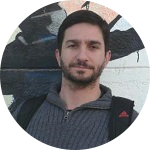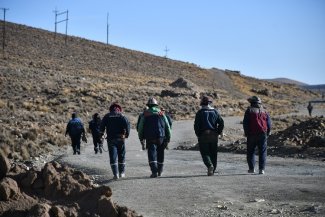The people’s resistance in Turkey is in its third week.
Since 20.00 on Saturday night, in Taksim Square and in many other districts of Istanbul, there have been non-stop clashes with the police.
Police brutally attacked peaceful protestors to clear the Gezi Park. They used tear gas, water cannons shooting liquid pepper spray and rubber bullets.
On early Friday morning, the Turkish Prime Minister Recep Tayyip Erdogan met with representatives of Taksim Solidarity including DİSK General Secretary Arzu Çerkezoglu and other representatives to find a solution to the ongoing protests.
The Prime Minister was in an angry and aggressive mood; after the meeting he called Çerkezoglu an "ultra-unionist".
However, a government spokesperson later conceded that they would respect to the court’s decision on whether or not construction of the shopping mall in Gezi Park – the only green public place in central Istanbul – should continue.
But this is no longer enough.
If government had said that three weeks ago, this might have been a solution. However, in the past 21 days, five people have died and more than 7,000 have been injured. 15 people have lost their eyes, 50 people are seriously injured people and thousands of people have been taken into custody.
In cities across the country, millions of people have poured onto the streets to demand the resignation of the government. The press estimates this number to be around 10 million people but the true figure may be higher.
The government has now limited all civilian access to Gezi Park and has recast the protestors as “marginal, illegal groups”.
The people oppose this and object to this.
On Saturday, Taksim Solidarity promised to normal the mobilisation by clearing some of the barricades and reducing the number of tents in the park.
However, at 20.00 police attacked Gezi Park with tear gas and rubber bullets, injuring hundreds of people and destroying the structures put up by protestors.
Since then, hundreds of thousands of people have poured onto the streets of Istanbul to take part in spontaneous protests.
They’ve blocked traffic on the main international motorway and marched to Taksim Square. They marched over to the Asian side of Bosphorus Bridge. Everywhere they clashed with the police.
Police brutality
Police officers are normally required to wear an identification number on their helmets but over the past few days there have been no numbers, allowing them to act with impunity.
They have attacked protestors in shopping malls, private homes and five-star hotels. There has been no limit to the police violence and I fear there will be many more deaths.
Clashes have spread to other Turkish cities like Ankara, Adana, Izmir and Eskisehir. Even in government strongholds like Kayseri and Konya people have been out on the streets.
On Sunday, a funeral was held for Ethem Sarisülük, a 27-year-old protestor shot in the head and killed by a police bullet. The incident was recorded and broadcast all over the world but police attacked the funeral with water cannons.
Turkish trade unions the Confederation of Progressive Trade Unions of Turkey (DISK) and the Confederation of Public Workers’ Unions (KESK) have declared a national strike and are calling on their members to be at anti-government demonstrations.
Prime Minster Erdogan’s reaction to the protests has been to polarise the people and suppress dissent with violence.
He has also mobilised his supporters with mass meetings in Ankara and Istanbul, where public resources has been used to pay for free food and transport.
Erdogan blames CNN, the BBC and other international media channels for broadcasting ‘fabricated’ news. He also blames foreign and domestic interest groups for trying to stop Turkey’s rise to global power.
But until now he has been keen to become a part of the EU and NATO, and has enjoyed US support.
Erdogan threatens the protestors and calls them “looters” and “traitors”.
His aim is to consolidate his support. After winning almost 50 per cent of the vote in the last election, he says that he still enjoys 50 per cent of the support while threatening the 50 per cent who didn’t vote for him.
But it is widely known that the Justice and Development Party (AKP) government is a coalition of different groups.
An estimated 10 per cent of its power based is made up of political Islamists. The AKP government came to power after the 2001 economic crisis in which the centre-right collapsed.
People who previously voted for secular, centre-right parties voted for Erdogan because of his programme for economic stability, but he faces losing this support as a result of his response to the Taksim Square protests and his authoritarian rule.
Additionally, the economy hasn’t been doing so well for the past year and on Thursday, the Turkish lira dropped to an 18-month low following weeks of unrest. And on top of that, his adventurous Syrian policy has put him at odds with the US.
It is important to note that Turkish economy is heavily dependent on foreign debt. The government fears that losing that flow of debt would bankrupt the economy.
So by polarising the nation, Erdogan has attempted to consolidate his power and show the world that he still enjoys the people’s support.
However, the number of people who are taking to the streets to resist the excessive police violence of the past few weeks demonstrates that this is the final phase of Erdogan’s rule.
The people of Turkey call on the international community for their support.
To join the ITUC/Labourstart campaign action on Turkey, click here.









